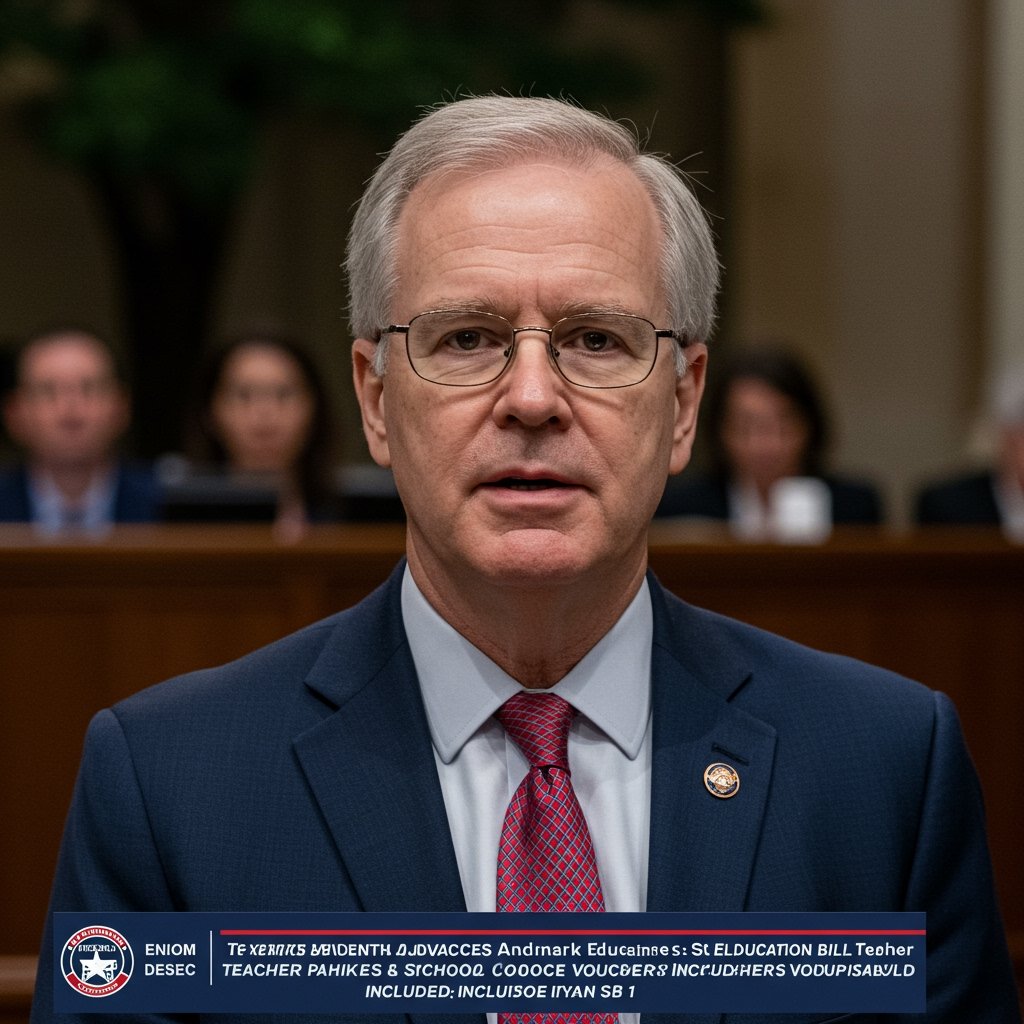Texas Senate Approves Major Education Bill
The Texas Senate, on Tuesday, April 29, 2025, marked a significant legislative milestone by passing Senate Bill 1 (SB 1), a comprehensive piece of legislation poised to reshape the state’s education landscape. The bill, a priority measure championed prominently by Senator Jane Smith (R-District 10), cleared the upper chamber after extensive debate, signaling a major step forward for its proponents. SB 1 encompasses a range of provisions, with its most discussed components focusing on substantial increases in teacher compensation and the introduction of a new, state-funded program offering parents greater choice in their children’s education.
Key Provisions of SB 1
Central to Senate Bill 1 are two primary fiscal allocations and policy directives. Firstly, the bill mandates funding designed to achieve a statewide average teacher pay raise of $5,000. Proponents argue this increase is critical for attracting and retaining qualified educators across Texas, particularly in areas facing teacher shortages. The raise is intended to boost morale, enhance the professional standing of teachers, and ultimately improve educational outcomes for students by stabilizing the teaching workforce. Details within the bill likely outline how this average increase will be implemented, whether through salary schedules, stipends, or a combination, though the core commitment is the $5,000 average bump.
Secondly, and perhaps more controversially, SB 1 allocates a substantial $500 million towards the establishment of a new parental choice voucher program. This program is designed to provide eligible parents with state funds, often in the form of vouchers or education savings accounts (ESAs), that can be used to cover tuition costs at private schools or potentially other approved educational expenses, such as tutoring or curriculum materials. The $500 million allocation suggests a significant initial investment in creating an alternative pathway for students outside the traditional public school system. Advocates for this program emphasize parental rights, arguing that parents should have the flexibility to choose the educational environment best suited for their child, regardless of their geographic location or socioeconomic status. They posit that increased competition from private schools could also incentivize improvements within the public school system.
Legislative Journey and Support
Senate Bill 1’s journey through the Texas Senate was shepherded by Senator Jane Smith, who represents District 10. As the bill’s champion, Senator Smith played a crucial role in negotiating its various components, building consensus among her colleagues, and presenting the case for its passage. Her support, alongside that of a majority of senators, underscored the priority status of this education package for many in the legislative body. The bill’s passage on April 29, 2025, followed committee hearings, floor debate, and the consideration of potential amendments, reflecting the thorough, albeit sometimes contentious, legislative process inherent in addressing complex policy issues like education reform. The Senate’s approval signifies a clear intent from that chamber to enact these specific changes.
Concerns and Opposition
Despite its passage in the Senate, SB 1 faces significant opposition, particularly regarding the parental choice voucher program. Opponents raise serious concerns about the potential impact of the voucher program on the funding and overall health of the public education system. Their primary argument centers on the fear that diverting public funds, even via vouchers, away from traditional public schools will exacerbate existing financial challenges, especially in rural or less affluent districts that may not have viable private school alternatives. Critics contend that this could lead to reduced resources for public schools, impacting programs, staffing, and facilities for the vast majority of Texas students who remain in the public system.
Furthermore, opponents often voice concerns about accountability and transparency within voucher programs, arguing that private schools accepting public funds should be subject to the same rigorous testing, reporting, and governance standards as public schools. Issues of equity are also raised, with critics questioning whether voucher amounts are sufficient to cover the full cost of private education, potentially limiting access only to families who can afford the difference, or whether private schools will be required to accept all students, including those with special needs. While the specific details of the SB 1 voucher program, beyond the $500 million allocation, are not fully detailed in the summary, these are common areas of debate surrounding such initiatives and likely form the basis of the opposition’s concerns.
Path Forward in the House
With Senate approval secured on Tuesday, April 29, 2025, Senate Bill 1 now advances to the Texas House of Representatives. This transition marks a critical new phase for the legislation. The House, with its different membership and political dynamics, will undertake its own review process. This typically involves assignment to one or more House committees, where public hearings will be held, allowing stakeholders, including educators, parents, administrators, and advocates on all sides, to offer testimony. The bill may undergo significant amendments in committee or during floor debate in the House as representatives propose changes to its provisions, particularly the controversial school choice component.
The political landscape in the House may differ from the Senate, potentially leading to different outcomes or compromises. Debates are anticipated to be robust, especially concerning the allocation of funds and the structure and oversight of the parental choice program. Supporters will lobby for swift passage of the bill in its current form, emphasizing the benefits of teacher raises and parental empowerment. Opponents will continue to highlight potential negative consequences for public schools and advocate for significant alterations or outright rejection of the voucher provisions. The fate of SB 1 hinges on its ability to garner sufficient support in the House, navigate potential amendments, and ultimately pass that chamber before the end of the legislative session. The journey through the House promises further scrutiny and debate on this potentially transformative education reform package.
Conclusion
The Texas Senate’s passage of Senate Bill 1 represents a bold move towards implementing significant changes in state education policy. Championed by Senator Jane Smith, the bill addresses critical areas of teacher compensation with a proposed $5,000 average raise and introduces a substantial $500 million initiative for parental school choice vouchers. As the legislation now moves to the House of Representatives for consideration, it carries the weight of these potential reforms alongside the considerable concerns raised by opponents regarding its impact on public school funding and the implications of expanding school choice. The upcoming debates and decisions in the House will ultimately determine the final form and future of this sweeping education reform effort in Texas.






